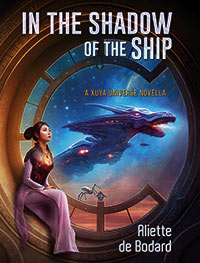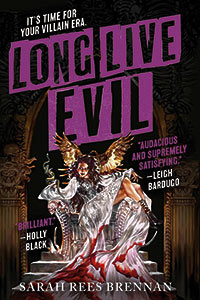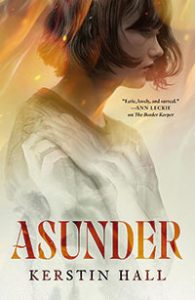The Year in Review 2024 by Liz Bourke

Look Back, Look Forward, Look Around
I have a list, every year, of books I wanted to read but for which I ran out of time. This year’s is even longer than usual (and it includes Nalo Hopkinson’s Blackheart Man, Jedediah Berry’s The Naming Song, Sascha Stronach’s The Sunforge, August Clarke’s Metal From Heaven, and Justinian Huang’s The Emperor and the Endless Palace, to name but a few). But for all the volumes I know I missed, and more that I’m sure escaped me entirely, I did manage to read some truly excellent novels this year, and more than one distressingly good novella.
Not much in the way of science fiction that really grabbed me, though, so let’s start with that. Aliette de Bodard had two novellas out this year, In the Shadow of the Ship and Navigational Entanglements, and while I enjoyed them both, Navigational Entanglements is the one I loved. Set in a different space opera universe than her award-winning Xuya continuity, but one that is nonetheless reminiscent of it in its social details, it features a set of misfits from rival clans – clans who have maintained a monopoly on faster-than-light travel – who have been required to work together to prevent disaster. That disaster comes in the form of a giant invisible extradimensional creature that resembles nothing so much as a space jellyfish, which has slipped into normal space on foot of an accident caused by a clan pilot. This creature, if not stopped, will cause a mass casualty event. Unfortunately, the team of misfits has been set up to fail and take the blame. And even worse for them, their despised leader is shortly found dead inside a locked room. Murder, romance, self-realisation, drama, last-minute saves: Navigational Entanglements has something for everyone. (Though betrayal by trusted authority figures is becoming something of a theme across de Bodard’s work: It seems you can almost never trust a parental figure possessed of social authority to have the best interests of their dependents at heart.)
 Sticking with novellas for the moment, this year also saw two novellas from Lois McMaster Bujold, in her ongoing Penric and Desdemona series. Bujold on a bad day can outdo a good three-quarters of the entire science fiction and fantasy field: How fortunate for us, then, that Demon Daughter and Penric and the Bandit are, if not Bujold’s best work, then certainly far from her worst. Demon Daughter presents Penric and his family with a dilemma in the form of a young girl, cast overboard from a ship, who is in possession of a very new demon, with all the complications that implies. Penric and the Bandit, meanwhile, is told largely from the point of view of a bandit who has fallen in with murderously bad company and would quite like to get out, but can’t see how. To him, Penric – who’s looking for ‘‘treasure’’ in a lost shrine in the hills – is a mark who might let him stay alive a while longer. To Penric, for whom treasure means something rather different than it does to his new dubiously ex-bandit friend, his new companion is a soul under Penric’s tutelary deity’s charge. Penric and the Bandit shows Penric in his element as both a clergyman and a trickster, and it’s a delightful read.
Sticking with novellas for the moment, this year also saw two novellas from Lois McMaster Bujold, in her ongoing Penric and Desdemona series. Bujold on a bad day can outdo a good three-quarters of the entire science fiction and fantasy field: How fortunate for us, then, that Demon Daughter and Penric and the Bandit are, if not Bujold’s best work, then certainly far from her worst. Demon Daughter presents Penric and his family with a dilemma in the form of a young girl, cast overboard from a ship, who is in possession of a very new demon, with all the complications that implies. Penric and the Bandit, meanwhile, is told largely from the point of view of a bandit who has fallen in with murderously bad company and would quite like to get out, but can’t see how. To him, Penric – who’s looking for ‘‘treasure’’ in a lost shrine in the hills – is a mark who might let him stay alive a while longer. To Penric, for whom treasure means something rather different than it does to his new dubiously ex-bandit friend, his new companion is a soul under Penric’s tutelary deity’s charge. Penric and the Bandit shows Penric in his element as both a clergyman and a trickster, and it’s a delightful read.
Honourable mention to Premee Mohamed’s The Butcher of the Forest, atmospheric and chilling as it is, though it’s a little too close to horror for my tastes.
2024 boasts two excellent fantasy novels that a) play with the role of a villain, b) draw on the (very popular in anime) isekai tradition of transporting or reincarnating a character from our world into a fantasy one, and c) possess a lively sense of humour along the way. Long Live Evil is Sarah Rees Brennan’s adult debut. Rae is dying, and seizes on a magical bargain to enter the world of her favourite book. There, she finds herself in the body of an infamous villainness, the night before said villainness is set to be executed. Rae can fix this! She knows the future! Also, she’s not entirely convinced that any of this is real, but meanwhile she can enjoy better health than she’s had in months and embrace her villain era. Unfortunately for her, she knows less than she thinks, and the individuals she knew as characters in a book have lives and motivations of their own, which – together with her own changes – drag her off balance. A fantastic, funny, and feminist examination of power, reputation, and personhood that simultaneously embraces and subverts the tropes common to young adult high fantasy romance, it’s a very good read.
 Speaking of embracing your villain era: How to Become the Dark Lord and Die Trying by Django Wexler is one of my three favourite novels of the year. Every time Davi dies, she wakes up at the exact same point in time that she first arrived in this fantasy world. It’s happened so many times she’s lost count, and can no longer recall much about her original world or life. She keeps trying to hold back the invasion of the Dark Lord’s army into human lands, and she keeps dying horribly. Maybe it’s time to join the other side and do a spot of Dark Lord-ing herself.
Speaking of embracing your villain era: How to Become the Dark Lord and Die Trying by Django Wexler is one of my three favourite novels of the year. Every time Davi dies, she wakes up at the exact same point in time that she first arrived in this fantasy world. It’s happened so many times she’s lost count, and can no longer recall much about her original world or life. She keeps trying to hold back the invasion of the Dark Lord’s army into human lands, and she keeps dying horribly. Maybe it’s time to join the other side and do a spot of Dark Lord-ing herself.
By turns serious and irreverent, this rollicking adventure story is also strongly interested in the nature of choices, ethics, and what it mean to be a person in a complicated world – and also what happens when your understanding of the how the world works is upended.
And speaking of (not quite exactly) time-loop stories, my favourite novel of the year is Melissa Caruso’s The Last Hour Between Worlds. Caruso can always be relied on for an entertaining read, but The Last Hour Between Worlds, her first novel in an entirely new series, is a book I loved on an uncomfortably deep level.
Kembral Thorne is a Hound, a member of a guild of investigators and guards that are part private investigator, part bounty hunter, and part law enforcement. She’s on maternity leave. Her daughter is two months old. Dona Marjorie Swift’s year-turning party is her first break from her newborn since she gave birth, and she’s looking forward to an evening of socialising with other adults. Unfortunately, Kem lives in a setting that’s the top layer of a multitiered cake of realities – the Prime layer – and it’s possible to drop down layers into more and more dangerous ‘‘Echoes.’’ Even more unfortunately, ancient Echo lords have turned Dona Majorie’s party into the site of a competition with human lives for playing pieces, and people keep dying. Let me quote from my previous review in Locus:
Every time the clock strikes midnight, two things happen: The entire party drops down into a deeper Echo, and time resets so that the party – with everyone alive once more – starts over again. Kem’s the only one who can remember it happening. She’s the only one with a hope of keeping the party’s attendees alive past the end of the evening. And her only real ally – the only other person she gets to remember what’s happening, and who stays conscious for it – is her sometime personal and professional nemesis from the Cat guild, Rika Nonesuch. Who once, memorably, drugged the then-pregnant Kem and left her unconscious and covered in stinking rubbish in an alleyway, after a conversation in which Kem thought they might have been admitting to having feelings for each other. But Rika is keeping secrets even now, and they might have a bearing on the problem at hand.
A fast-paced, high-stakes, witty and atmospheric novel, with a wryly compelling voice and an intensely relatable protagonist. Also, I can count on the fingers of one hand the number of new mothers I’ve seen who are allowed be competent action-hero-type professionals in fiction. I adore it. I want all the sequels for it.
Kerstin Hall’s Asunder may not be my very favourite novel of 2024 (though it’s definitely up there) but in technical accomplishment and breadth of vision (and for pure inventive worldbuilding), I believe it may be the best.
 Karys Eska is locked into an irrevocable compact with Sabaster, a terrifying and unforgiving otherworldly being. (Sabaster is very much not sexy, in case you were wondering.) The time until Sabaster calls the compact in and Karys stops being able to survive as anything recognisable as Karys is running out, which lends a certain desperation to all of her choices. When a job goes wrong, she finds herself with a dying stranger bound into her shadow. The binding will likely kill them both in short order, if Karys cannot find a way to survivably undo it. And so, pursued by multiple factions for what they think she knows or possesses, and with few allies, Karys sets out on a dangerous journey.
Karys Eska is locked into an irrevocable compact with Sabaster, a terrifying and unforgiving otherworldly being. (Sabaster is very much not sexy, in case you were wondering.) The time until Sabaster calls the compact in and Karys stops being able to survive as anything recognisable as Karys is running out, which lends a certain desperation to all of her choices. When a job goes wrong, she finds herself with a dying stranger bound into her shadow. The binding will likely kill them both in short order, if Karys cannot find a way to survivably undo it. And so, pursued by multiple factions for what they think she knows or possesses, and with few allies, Karys sets out on a dangerous journey.
Asunder is a novel deeply interested in desperate choices, in the trap of having no real good options and stubbornly eking out a way forward anyway. It’s also, to quote from my review in the September 2024 issue of this magazine,
A fast-paced, tense ride through a world that doesn’t hold back from glittering weirdness. Luxury travel in the bellies of dimension-hoping spiders, weapons that turn a person inside out, trains that run on rails made of light, drugs made from the corpses of dead gods, godlike beings with hundreds of wings and faces in their groins: Hall holds back neither wonder nor horror. But throughout, Hall’s skill and control of the narrative never falters. All the moving pieces slot into place, building into a nail-biting climax.
It’s phenomenal, and it’s passed under far too many people’s radar. I can’t recommend it highly enough.
The year’s other highlights include the following:
- T. Kingfisher’s latest standalone fantasy novel, A Sorceress Comes to Call, which is a fantastic cross between gothic and fantasy of manners. A pragmatic ageing spinster and a young teenager join forces to thwart the evil sorceress that is the young teenager’s sociopathic mother. It has all of Kingfisher’s trademark humour and compassion, and some truly horrifying moments.
- Sophie Burnham’s debut novel Sargassa, in which apparently Rome never fell (but all is not as it seems) and the family of the murdered Imperial Librarian contend with secrets, lies, relations of power, and the corrupting influence of a system built on slavery and coercion. Burnham sets their sights on heavy themes, and has the skill with prose and characterisation to pull off a very satisfying debut.
- The Book of Gold, by Ruth Frances Long, set in a city much like 16th-century Antwerp but with gods and magic, where a desperate thief undertakes a heist in order to save her printer brother from execution on charges of sedition. I very much enjoyed this: It’s great fun.
- Lady Eve’s Last Con by Rebecca Fraimow, a science fiction caper of revenge in which a con-artist finds herself falling for her wealthy mark’s complicated sister. Light, but not slight: It’s very entertaining.
Liz Bourke is a cranky queer person who reads books. She holds a Ph.D in Classics from Trinity College, Dublin. Her first book, Sleeping With Monsters, a collection of reviews and criticism, is out now from Aqueduct Press. Find her at her blog, her Patreon, or Twitter. She supports the work of the Irish Refugee Council and the Abortion Rights Campaign.
This review and more like it in the February 2025 issue of Locus.
 While you are here, please take a moment to support Locus with a one-time or recurring donation. We rely on reader donations to keep the magazine and site going, and would like to keep the site paywall free, but WE NEED YOUR FINANCIAL SUPPORT to continue quality coverage of the science fiction and fantasy field.
While you are here, please take a moment to support Locus with a one-time or recurring donation. We rely on reader donations to keep the magazine and site going, and would like to keep the site paywall free, but WE NEED YOUR FINANCIAL SUPPORT to continue quality coverage of the science fiction and fantasy field.
©Locus Magazine. Copyrighted material may not be republished without permission of LSFF.







